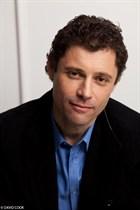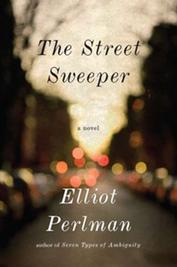 Elliot Perlman is a barrister in Melbourne, Australia, who has published two novels, Three Dollars and Seven Types of Ambiguity, and a story collection, The Reasons I Won't Be Coming. In his sprawling new novel, The Street Sweeper (Riverhead, January 5, 2012), Perlman puts a deeply personal spin on two of the 20th century's most fraught topics: the Holocaust and the American civil rights movement.
Elliot Perlman is a barrister in Melbourne, Australia, who has published two novels, Three Dollars and Seven Types of Ambiguity, and a story collection, The Reasons I Won't Be Coming. In his sprawling new novel, The Street Sweeper (Riverhead, January 5, 2012), Perlman puts a deeply personal spin on two of the 20th century's most fraught topics: the Holocaust and the American civil rights movement.
You're Australian, though you spent several years in New York City. What inspired you to tackle the civil rights movement?
I grew up thinking of the movement as a very recent chapter in the history of the enlightenment, that being an attempt by our species to rid ourselves of irrational ideas and act in the service of rationality and justice. I was always fascinated by that. And it's one of those rare examples, like the Holocaust, where it's fairly unequivocal which side the good guys were on.
Did your years in New York change how you thought about this?
It was never put to me quite this way, but I was taught that what might be called the golden age of black-Jewish relations in the U.S. never faded. When I moved to New York, I learned there are all sorts of schisms, not just between the black community and the Jewish community, but you almost can't talk about the "community" because each group is so riven with schisms. And this might sound incredibly naive, but I just didn't know about black anti-Semitism, and I didn't know that there was ongoing racism against blacks in New York, which I held to be the bastion of liberalism.
One of your characters is the first man to interview death camp survivors. Did you imagine yourself writing for people who didn't know as much about these events?
I have some enormously loyal readers in the U.S. Many of them will know much of what I was writing about. But some of them don't know quite as much as I put in there, even about U.S. history, let alone about European or Jewish history. Then there might be readers who know almost nothing about these. Growing up, it was often novels that alerted me to things which I would then learn about other ways. Novels are a form of entertainment, but they can also be a source of education and enlightenment. I've tried to tread a fine line.

It's definitely less well known. And I'm writing for British, French, German, Danish audiences as well. You never know what part of the story they don't know.
I've had older Australians tell me that they lived through the civil rights movement from a distance, and they remember the turmoil and the turbulence, but not the detail. This reminded them. And I'm sure a similar thing could be said about the Holocaust.
Could you give us a bit of insight into your thinking about the relationship between history and memory?
It's often largely by chance that certain things become the received view of an event.
When finally survivors were being interviewed, if you'd interviewed the person next to the person you spoke to, you'd've gotten a different story. People think that they know about the Holocaust, but what they really know are certain images. People think, 'That's awful, and I've seen it, so I've "done" the Holocaust.' Most of that footage was taken by Western soldiers, and they didn't get to a single death camp, which were liberated by the Soviet Union. That footage actually isn't from the very worst places. What most people think of the Holocaust is frequently not quite right.
It's just a quirk of geopolitics, if you like, that one group of camps is better known. On a more personal scale, as the late Primo Levi said, not only can words not adequately put the reader in the position of a victim, even the survivors give a minority version of the events. Most victims died within 48 hours of arriving in Auschwitz. You can't hear that story because there's no one around to tell it.
In that way, it's quite random which memories become history. You get survivors who don't really want to talk about what happened to them. so their stories don't become history. Even in your own life, maybe something tragic occurred when you were nine and you remember that as characterizing the year or even your childhood. You become typecast in your mind as the person that experiences a tragic event. But the day before, a million kids were playing with you at your birthday party. --Kelly Faircloth, freelance writer

